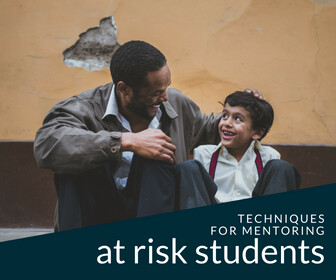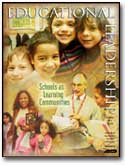Is it Tuesday?” Leyla asked with an enthusiasm normally reserved for birthdays or holidays. Why all this interest in Tuesday? I wondered, gazing at the 1st grader, whose bangs kept falling over her dark eyes as her glasses slipped slowly down her nose. Of course, I finally realized: Tuesday is the day her mentor, Ms. Carrie, visits.
I should have made this connection. Only a week earlier, I had witnessed how eagerly Leyla greeted Ms. Carrie. Leyla was eating lunch in the school's cafeteria when she spied Ms. Carrie walking down the hallway. Leyla sprang from her seat and—with the speed and determination of an Olympic athlete—charged toward her mentor, practically knocking her over with a tackling embrace.
That was Ms. Carrie's second visit.
Ms. Carrie and Leyla are now in their second year of our mentoring program at Parklawn Elementary School in Fairfax County, Virginia, where I serve as the mentor coordinator. Ms. Carrie is a young, single, professional woman volunteering in a public school for the first time. In addition to helping Leyla understand the fickle nature of youthful friendships and deal with the confusion of growing up, Ms. Carrie has baked cookies for Leyla's class and even attended a school concert. More important, Leyla is learning the significance of establishing a personal relationship and is benefiting from the comfort and security it provides and the confidence it builds.
The daughter of non-English-speaking parents—both of whom work two jobs to make ends meet—Leyla begins and ends her day in the county child care program housed at the school. Her 1st grade teacher identified her as a child who needed a “connection” to increase her self-esteem and confidence and to help prevent her from falling through the cracks.
Research has found that mentoring programs can improve students' peer and family relationships, school attendance, performance, and attitude. What's more, students with mentors are less likely to use illegal drugs, skip school, or engage in school violence (Banicky & Noble, 2000; Jekielek, Moore, Hair, & Scarupa, 2002; Northwest Regional Education Laboratory, 1998).
Yet for me, anecdotal evidence gleaned from four years as mentor coordinator best illustrates the benefits of mentoring. Our experience at Parklawn has taught us that effective mentoring programs require careful selection and preparation of mentors as well as ongoing support. The backbone of the program is community involvement: local residents willing to make a connection with young people, gain their trust, foster mutual respect, and make a sustained, intensive, personal commitment.
Structure of the Program
Of the 50 students participating in our mentoring program, some come from financially struggling families, some tend to a chronically ill or disabled parent, some are adjusting to a new country, and others are adjusting to major family changes. Some signal their need for extra attention by regularly getting into minor trouble in school. Others are quiet, shy students who need a confidence boost. Regardless of their background, all the mentored students need someone to care about them, listen to them, and provide a little extra help to get them through their week.
Teachers, administrators, counselors, and parents recommend students for mentoring based on need. Students must receive full, written support and permission from their parents before participating.
The mentors are as diverse as the students who need them. They work in offices, drive school buses, edit magazines, serve in our police force, and even teach. They all share a common interest in helping a student who needs special attention, and they all take this role and its responsibilities seriously.
The school carefully selects each mentor to address the needs of a specific student and support his or her growth and academic success. Although mentors are volunteers, they must complete a formal application process set by Fairfax County Public Schools that includes attending a training session and undergoing a background check. During the training session, we tell volunteers about the benefits of making a difference in a student's life and outline strategies to make their mentoring relationships successful. The session also touches on such sensitive issues as confidentiality. Once the mentors complete the process, they are scheduled to visit their student at school once a week at a time that is mutually agreeable to the teacher, student, and mentor.
Just as important as mentors' proper selection and training is providing them with ongoing assistance and resources. As the school's mentor coordinator, I supervise the mentors, offer support and ongoing training as needed, and maintain a stock of board games and art supplies for use during their school visits.
What Do Mentors Do?
Each mentor has a distinct way of bringing joy and self-esteem to his or her student. Many achieve these goals by helping their mentees realize hidden talents. Mimi is a soft-spoken 4th grader who frequently expresses concern about her chronically ill father. Her mentor, Ms. Diane, who works for an education magazine, was searching for children's artwork to feature on the cover of a particular issue. During a visit, Ms. Diane gave Mimi crayons, pencils, and paper for an art activity and tapped into unknown artistic talent. Mimi produced a unique drawing of an imaginary person that became part of the magazine cover. When the typically meek youngster visits my office and sees the magazine cover on the wall, she often reminds me, “I am so lucky to have Ms. Diane for a mentor. She likes how I draw, and she likes to listen to me tell stories!”
Natasha joined the mentoring program when her mother and her 1st grade teacher shared concerns that Natasha's lack of interpersonal skills was causing her difficulty. Ms. Sherry, an office employee, was eager to help Natasha because, as she recalls, “I wish I had a mentor when I was a child. I was a lot like Natasha.” At last year's winter concert, Natasha was scheduled to sing. Ms. Sherry promised to attend and bring her camera to capture the big event. That day, Natasha ran to my office as soon as she arrived at school. Glowing with confidence, she announced, “Ms. Sherry is coming to the concert, and she is going to take my picture!”
Carlos was a Bolivian immigrant who spoke little English. He joined the mentoring program after his mother, a trained educator in Bolivia, shared with his teacher her concerns about Carlos's difficulty learning a new language, achieving academically, and making new friends. Ms. Joan, who works for a local company and is herself a grandmother, agreed to work with Carlos. We gathered materials from the English for Speakers of Other Languages teacher and introduced ourselves to Carlos. On one visit, Carlos asked if other friends could join them. Ms. Joan, Carlos, his mother (who was assisting the teacher that day), and some of Carlos's friends played Go Fish, reading the words on the cards and identifying their relationship to the pictures. This activity, which enhanced not only Carlos's English language skills but also his social standing, became a regular feature of Ms. Joan's visits.
Brian, an energetic 2nd grader already standing 40 inches tall, has found a perfect mentor in Officer Andrew, a police officer with the build of a professional football player. Despite the long, variable work hours required by his job, Officer Andrew maintains regular contact with Brian, and the two have formed a bond as they shoot baskets in the school gym. When Officer Andrew's grandfather passed away, he had to drive to Florida with his family for the funeral. This personal emergency fell on the same day as his regular visit with Brian, and he knew that the trip might extend through several more scheduled visits. Conscientious about his commitment, Officer Andrew came to see Brian before he left to explain why he would be absent for a while. For this quick visit, he wore a sport coat and slacks instead of the usual police uniform. To this day, Brian reminds his mom and me of the time when “Officer Andrew wore regular clothes!”
Mentoring relationships often extend beyond face-to-face meetings. Ms. Karen is now in her second year of working with Yesenia, a shy, well-behaved 4th grader who struggles with classwork. Ms. Karen's job requires much out-of-town travel, but when she travels on business she reports to Yesenia her complete itinerary and then sends her a picture postcard with a note describing the local sights. In addition to familiarizing Yesenia with a variety of locations she has never visited, this gesture reminds Yesenia that Ms. Karen is thinking about her even when she's out of town.
Mr. Brett, a young professional whom I never see without a neatly pressed shirt and fashionable tie, mentors Kenny, an active 5th grader. Kenny's teacher and parents hoped a mentor could help him improve his focus in class. Last Halloween, Mr. Brett arrived at school wearing dark glasses and a large, bushy wig. Although at first Kenny did not recognize his visitor, he began laughing when he realized who it was and proudly announced to his classmates, “This is Mr. Brett, my mentor! He has made me laugh before, but this is the coolest!” Kenny still lights up whenever we talk about that Halloween. More important, he acknowledges that although he once visited the principal's office “a lot,” his visits have decreased since meeting Mr. Brett.
The newly discovered musical talent and artistic ability, the photos, the postcards, the card games, the chocolate chip cookies, the surprise costumes—they're all ingredients of a complex and nourishing stew of experiences that enriches everyone involved in the program, including the mentors themselves. As one mentor relates,What happened at the end-of-the-year ice cream party really melted my heart. When it was time to say goodbye, my mentee, who had initially been so shy, ran over to me and gave me a big hug. Never before had she been so outgoing. That hug meant the world to me. I immediately thought, “Sign me up for next year!”

